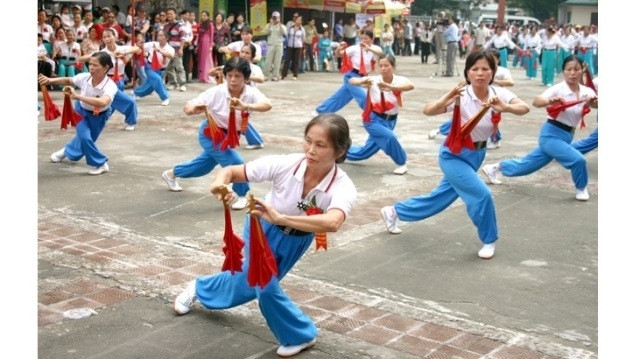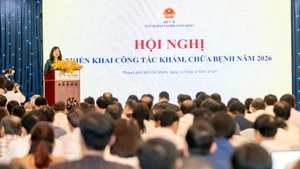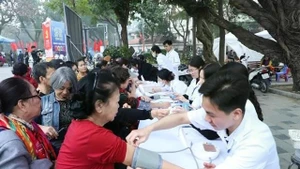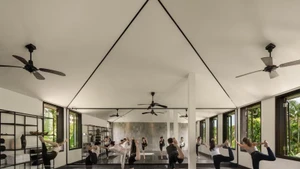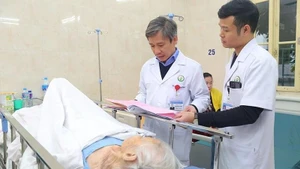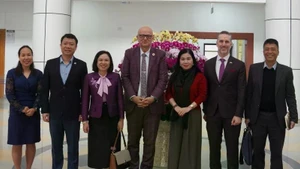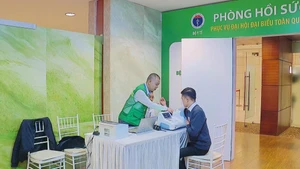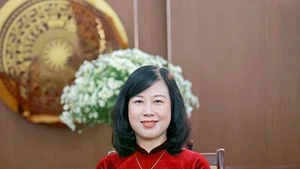Tuan was speaking at an international seminar held in Hanoi this morning by the Ministry of Health and the Asia-Pacific Economic Cooperation (APEC) Secretariat to discuss international experience sharing on population aging.
The seminar gathered over 200 delegates in the fields of economics, finance, banking, insurance, healthcare, employment and social security from APEC member countries, UN agencies, international organisations as well as research institutes and universities.
Speaking at the event, Deputy Minister Tuan said that the APEC member countries account for 40.5% of the world's population but account for nearly 50% of the world's elderly population. The majority of APEC members have been facing issues related to aging populations, some of which have high numbers and proportions of older people, such as China, the US and Japan.
Vietnam has officially entered the aging phase of the population since 2011, with a rapid increase pace of aging in the context of a low middle income country.
Currently, Vietnam has about 10.1 million elderly people, accounting for 11% of the population. The number of people aged 80 and above is two million. It is projected that by 2030, the proportion of the elderly in Vietnam will be 18% and 20% by 2050, respectively. If developed economies take decades or even centuries to move from an aging phase of population to an aging population, then the process took Vietnam only 15 years.
Sharing on the perception of considering the elderly as a burden to the society, Deputy Minister Tuan stressed the need to have a proper view on this issue.
While the aging population is a challenge, it is also an opportunity. For example, to care for the elderly, all issues of education, training, social security, healthcare and economic development need their own development direction.
There are many issues related to the elderly such as the design of housing construction, roads and facilities to support the elderly, as well as training for nurses and doctors to serve them. Accordingly, this is an opportunity for businesses to research and develop several areas to serve the needs of the elderly. Therefore, the elderly also contribute to socio-economic development, Tuan said.
He took an example in Australia that several large corporations with about eight subsidiaries have developed services to attend to the specific needs of the elderly, which have been exported to China.
Giving his comments on Vietnam's rapidly aging population in relation to the current economic situation, the deputy health minister said that the country has had a number of practical policies and activities to adapt to population aging.
The Ministry of Health has issued a project on healthcare for the elderly with a comprehensive view on enhancing elderly care in the community, as only relying on hospitals or nursing homes alone would be costly and expensive.
"The Vietnamese have a family-based culture, in which all generations live together in the home, which is considered a positive cultural aspect by the international community and should be a strong point in healthcare policies for the elderly in the community. At present, the Ministry of Health is also developing a community-based caring model for the elderly and encourages businesses and individuals to join together," said Deputy Minister Tuan.
Since 2010, the ministry has been studying and developing policies for long-term healthcare for the elderly. However, Vietnam will face many challenges in implementing this policy, especially economically as on average elderly people are prone to two chronic diseases or more and their economic conditions are usually quite difficult. Therefore, adapting to the aging population is a challenging task, requiring the participation of all sectors at all levels.
The deputy minister expressed his wish that the workshop would help APEC economies and Vietnam to formulate policies and set out specific goals, measures and actions to adapt to the aging phase and aging population in Vietnam over the coming time.
At the two-day conference, experts jointly shared a panoramic picture of APEC's aging population, including the status, trends, challenges and opportunities for economics, investment, healthcare, social security and employment in the context of the aging population.
The workshop also introduced a number of models and initiatives to promote the role and care of the elderly based on the family and the community. In the framework of the workshop, participants will take a field trip to visit an elderly care facility in Hanoi’s Soc Son district.
Policy recommendations on adaptation to population aging at the workshop will be submitted and discussed in health policy dialogues and at meetings of the Health Working Group and the APEC Ministerial Meetings of Health Ministers under APEC Third Senior officials’ Meeting (SOM 3), scheduled to take place in Ho Chi Minh City next month.
